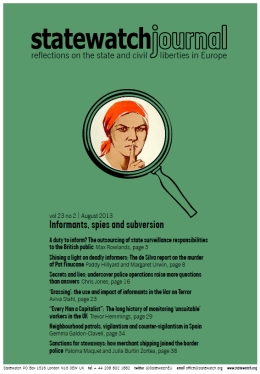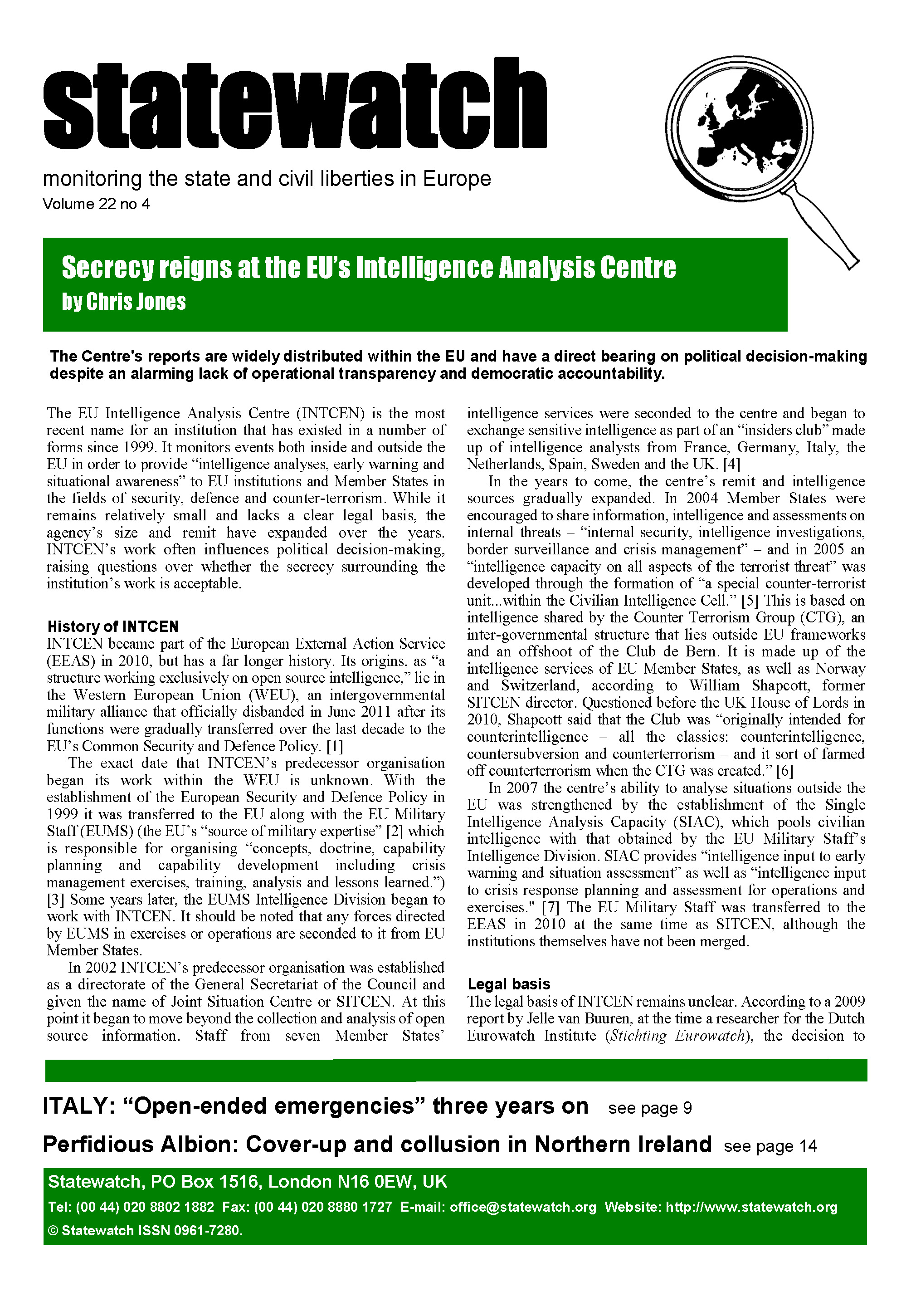Vol 23(1): Austerity, democracy and civil liberties
Topic
Country/Region
01 March 2013
Support our work: become a Friend of Statewatch from as little as £1/€1 per month.
Download the journal in pdf format
From the editorial: "The financial crisis that began in the banking sector five-and-a-half years ago has devastated European economies. In the time since this collection was conceived, Cyprus has become the latest country to accept crippling austerity in return for EU-IMF life support for its stricken financial sector. Few would bet against further bailouts in the Eurozone and only the foolhardy dare suggest that the worst is over. Regardless, the impact of austerity programmes already underway will be with us for years to come."
Contents
Discipline and discontent: coalition government extends "slave labour" welfare policy by Chris Jones
Under the government’s Work Programme, unemployed people must work for free for private companies such as Tesco and Primark or face losing their benefit payments. These companies manage the programme “without prescription from government” and are given access to sensitive personal data. The government is determined to bolster the number of people involved in the scheme. Disabled people have been increasingly targeted for enrolment and the government’s Universal Credit welfare plan will see thousands of individuals become eligible for referral.
Kick 'em all out? Anti-politics and post-democracy in the European Union by Leigh Phillips
“¡Que se vayan todos!” (“Kick ‘em all out!”) - A popular slogan on mobilisations against the entirety of the Argentine political class during the country’s 2001 economic crisis; “French statesman Georges Clemenceau said war was too important to leave to the generals. I’m beginning to think Europe is too important to leave to the politicians” - European commissioner Neelie Kroes in Het Financieele Dagblad (8 February 2013)
Austerity policies also cut rights and liberties in Spain by Peio M. Aierbe
The austerity policies implemented in response to what has generically come to be called “the crisis” have a stated objective: to prune the social gains that have been won over time. Fear is being used to coerce the population into accepting these cuts. This pruning process has affected practically every sphere of political, economic and social life to the extent that many citizen’s rights and liberties have been lost.
Using the Italian crisis to impose control: a shift towards a fiscal surveillance state? by Yasha Maccanico
The “technical” government has introduced passports for small children, limits on cash transactions, compulsory bank accounts and the “redditometro” (income-meter) to counter tax evasion.
Golden Dawn and the deafening silence of Europe by Jerome Roos
With a neo-Nazi party on the rise in Greece, it seems that even a Weimar-like scenario might be tolerable for EU leaders insisting on further austerity.
Collective punishment and pre-emptive policing in times of riot and resistance by Nick Moss
Anti-austerity protests and the revolts of August 2011 have led to the introduction of increasingly draconian forms of policing. Individuals involved in these demonstrations face severe collective punishments by the courts for the combined effect of what is done en masse.
Belgian ‘municipal fines’ cause growing dissent by Kees Hudig
Fines have been issued for an array of bizarre “offences” and have been used to target individuals involved in organising political protests.
Reviews
Fatally Flawed: Has the state learned lessons from the deaths of children and young people in prison? Prison Reform Trust and INQUEST
Xénophobie Business – A quoi servent les contrôles migratoires? [Xenophobia business – What is the point of migration controls?] Claire Rodier
New material
Reports and research sources covering civil liberties, immigration and asylum, law, military, policing, prisons, racism and fascism, and security and intelligence.
Download the journal in pdf format
Our work is only possible with your support.
Become a Friend of Statewatch from as little as £1/€1 per month.
Spotted an error? If you've spotted a problem with this page, just click once to let us know.

